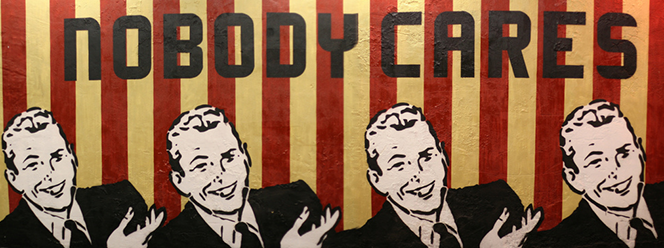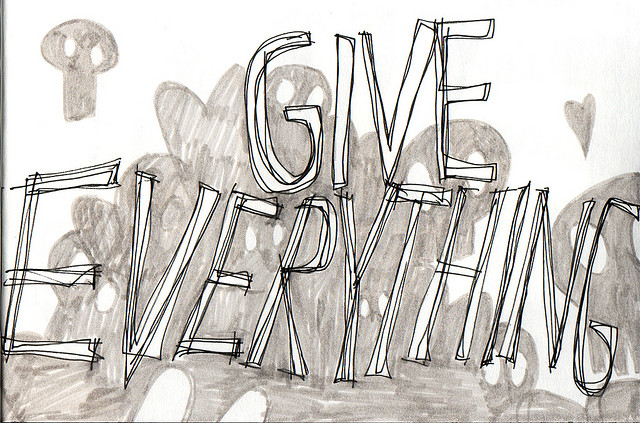
by Tara Joyce | Jun 15, 2016 | Cultural Creativity

We learn to articulate our personal power by saying no.
Feeling my desire to be agreeable, and my fear of rejection, I say no anyway. I learn to be more me.
There is wonder in the myriad of consequences created by responding negatively to requests. There is magic in how life moves forward, without interruption. “No” proves to be less important than we think it is.
Our agreeableness is not that valuable. Assertive and at ease, when I can say no with freedom, I can say yes with utmost certainty, sincerity, and enthusiasm. This is the space I desire to be.
Yes almost always has a cost. I can feel good paying it when I know my reasons are rooted in what I value and appreciate. I can no longer be agreeable for agreeable’s sake. The price is one I’m no longer willing to pay.
photo credit: Martin Howard

by Tara Joyce | Feb 16, 2016 | Personal Branding, Self/Business Growth

Have you noticed — when you are living for the moment — you’re not attached to some fixed idea of who you are? In those moments of presence, you are you — you are nobody. There is no attachment to any idea of who you are.
In those moments, you experience ultimate freedom.
Our ego holds a powerful hold over us — and it causes us a lot of trouble. Situated in our lower mind, our ego is the part of our mental construct that needs for us to be a fixed thing, and one which is desirable and knowledgeable. Whereas our higher mind understands the freedom of being nobody, of needing no sense of fixed self. It knows the value of letting go of the desire to be desirable, and it accepts that our ignorance is our path to freedom.
Despite what our ego tells us, what we need is to be open and learn. What we do not need is to give into our desire to be seen as special. Only when we’re not attached to who we are, can we allow ourselves to be — and be seen.
photo credit: Chris Brown

by Tara Joyce | Feb 20, 2015 | Personal Branding, Self/Business Growth

My lower mind is the part of my mental construct that demands for me to be a fixed thing. It desires definition and certainty. It desires to pin ME down. Whereas my higher mind understands the freedom I receive from being nobody.
My higher mind sees the value of having no sense of self that is fixed. It has no desire to define ME. When I am free from this burden of desire, I am more wholly me. I am who I AM. Whereas my lower mind needs to attach to certain attributes; fortifying and grounding me — in my expertise, in my knowledgability, and in my desirability. It relishes defining me as a real somebody.
What value does tying myself down hold? Where can I go when I hold myself in place? I know I need not fix myself in place. I know I need not define ME. What I need is to practice letting go of the desire to be desirable. What I need is to accept ignorance is the path to my freedom.
In my desperation to be seen as special, may I find my wisdom and my power to be the nobody I truly am.
photo credit: Sam Simpson

by Tara Joyce | Aug 5, 2014 | Cultural Creativity, Pay What It's Worth Pricing

There’s always been something about the statement, “give freely, receive freely” that didn’t work for me, but I could never quite put my finger on it. The sentiment sounded so lovely, but I knew there was something I was missing. I needed to see beyond the freedom ideal, to the totality of the statement.
Have you ever been given something that is more work to receive than the value you place on it?
Have you ever been given something that came with conditions?
If I give freely, without restraint, I will receive freely, without restraint. But is giving, and receiving, in this way what’s best for me?
What I really need is to NOT be totally free. What I really need is to have some constraints. Because the truth is, sometimes, the thing I’m giving is something you’d benefit from NOT receiving.
Sometimes, I’m unbalanced in my giving. Sometimes, I give for the wrong reasons. You do not need to receive everything that I want to give you, just as I don’t need to receive everything that you want to give me. Sometimes, you and I give for the wrong reasons, and it’s important to honour this truth about ourselves.
I could leave myself open and free to receive whatever, and open and free to give it too, but I know that’s not what’s best for me. I could “give freely, receive freely” without bias, but then I wouldn’t be responsible to the whole truth of myself, and of you — that sometimes the things I want to give, you do not need; and sometimes the things you want for me to receive, I do not need. Sometimes, our giving isn’t helpful or generous.
So truly, giving freely does means receiving freely, and this includes exchanging all our “stuff” that would more responsibly be managed with more constraints, not less.
photo credit: Ari Moore








